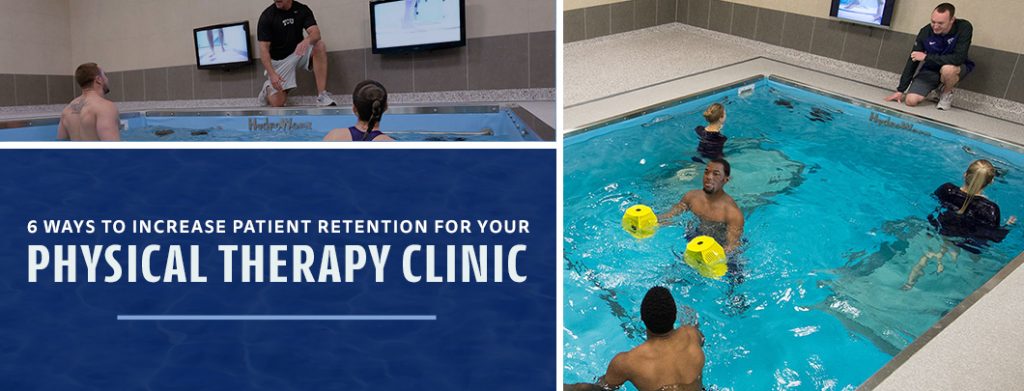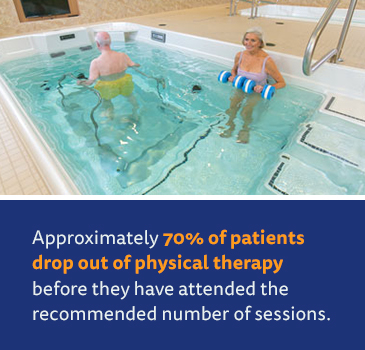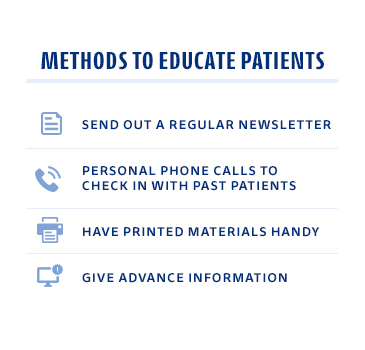Practicing physical therapy requires education and discipline, as you know. Then, in addition to your basic education and licensing, you need to constantly be learning about new techniques and new therapies to provide your patients with the best care possible.
Running your physical therapy clinic, hiring staff and paying the bills, however, requires some unique skills. Your physical therapy clinic takes business and marketing knowledge to operate — on top of your physical therapy expertise. Simply treating patients does not guarantee you will always have new patients coming through the door.
Once you have established some patients for your physical therapy clinic, a patient retention program can ensure continued growth. Getting patients in the door of your physical therapy clinic is the first step. The next step is retaining those patients and getting additional new patients they refer to you.
Fortunately, physical therapy patient retention methods are not difficult to learn or execute.
Jump to Sections:
- What Is the Value of Physical Therapy Patient Retention?
- Decrease Physical Therapy Churn Rate
- Educating Your Patients
- Using Appointment Reminders
- Sending Satisfaction Surveys to Your Patients
- Setting Up a Physical Therapy Referral Program
- Providing Services That Your Competitors Don’t
- Contact HydroWorx to Learn More
What Is the Value of Physical Therapy Patient Retention?
Attracting new patients to your physical therapy clinic is probably at the top of your list for marketing efforts. After all, new patients represent new business and that means more revenue. When you started your physical therapy practice, you had to find a way to attract new patients, and you have probably continued using the same methods.
What about making an effort to retain the patients you have? You made the effort to bring them in in the first place, but are you doing all you can to get the most benefit out of them? If not, some of your marketing budget is being wasted.
It actually costs more to attract new patients than it does to retain current patients. You have to spend time and money educating potential patients about what you do, the services you offer and how you are different from other physical therapy clinics. The up-front investment in time and money to establish a new patient can be great.
Efforts to retain an existing patient, however, can be much more cost-effective. Current patients already know who you are and what you do. They have already benefited from your services. Make the most out of their positive experience, and your current patient could become a long-time patient. They can also bring in other new patients through word of mouth or a referral program with less effort on your part.
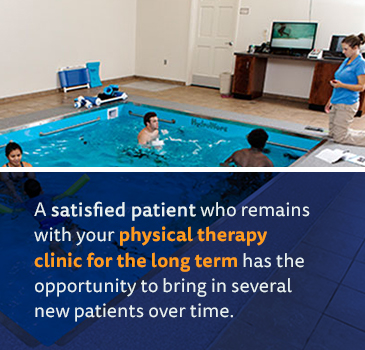
Each of your current patients is part of a demographic that fits your ideal client base. Allowing your patients to act as brand ambassadors for your clinic cuts out the cost of identifying and reaching your target demographic.
When you have a group of loyal customers, you have a strong fan base for your physical therapy clinic. Loyal customers like to interact with other patients via online reviews and other organic promotions. Approximately 27% of social media users post health-related status updates. Think of the possibilities if they were spreading the good news about your physical therapy clinic.

Your regular patients gathering on social media also become a free vehicle for your marketing communications. When you let your fan base know about a new service you are offering, they spread the word for you. They are also more likely to try your new service themselves.
Retaining patients for your physical therapy clinic has several advantages over attracting new patients. Although it is important to do both, here are some ideas for physical therapy patient retention methods.
Decrease Physical Therapy Patient Churn Rate
Your patient churn rate is the percentage of patients who drop out before they have completed the recommended number of physical therapy sessions. We know that patients who do not complete their course of treatment are more likely to experience less-than-optimum results. Regardless of the quality of care you provide them, patients who are not satisfied with the outcome will blame the physical therapy clinic.
According to a recent study published by Strive Labs, approximately 70% of patients drop out of physical therapy before they have attended the recommended number of sessions. That is a lot of potentially unsatisfied customers. By keeping these patients engaged long enough to complete their recommended course of therapy, you can increase positive outcomes and build a bigger fan base.
Start by calculating the churn rate at your physical therapy clinic. For each patient, identify the number of sessions attended and divide that by the number of sessions recommended. Multiply that number by 100 to get the churn rate for each patient expressed as a percentage. Average all of your patient percentages together to see the churn rate for your entire practice.
Tracking your churn rate will help you see if the efforts you are making to retain patients are working. The lower your churn rate, the better your patient retention. Here are some tips for decreasing your patient churn rate:
- Start with a great first impression. Many people are intimidated by physical therapy because they have no experience with it, and most of your patients come to therapy with pain that can severely affect their mental outlook. Make sure each patient gets a fantastic first impression of your clinic. You want them to feel comfortable and hopeful that you are going to make them feel better.
- Offer superior care. Exceeding patient expectations is a great way to keep them coming back. This means managing their expectations from the beginning and then providing a better outcome.
- Understand your competition. Physical therapy clinics have become popular in the last decade. You are probably not the only option for your patients’ treatment. Learn what your competitors offer and what you can do to stand out.
- Be a good listener. You are the expert, but it is the patient who is experiencing the pain. Recognize that there is an emotional component to physical disability, even if it is only temporary. Getting your patients to feel that someone is listening to them and genuinely wants to help will allow you to develop a better rapport.
- Teach your patients. The more patients know about their physical therapy treatments, the more compliant they will be. Explain some of the theory behind what you are doing and how it is going to help your patient overcome their condition.
- Build loyalty. When your patients arrive for their appointments, let them know you were expecting them and have prepared for their session. Make them feel like an important part of your day. Make them feel like you are working with them as a team and their participation is vital.
- Identify drop out risks early. For “at risk” patients, early intervention is key. Take note of behaviors that suggest a lack of commitment to the process or a disinterest in the outcome. You’ll want to work harder to make a personal connection with these patients to keep them coming back.
- Find out why patients drop out. Use some type of exit interview to determine why patients stop coming to physical therapy before their course of treatment is completed. This information will help you make changes that will increase your retention rate.
- Offer alternative modalities. Offering different modality types provides options to patients who have difficulty using one modality type. It also creates variety for those who become tired of repetitive exercises. Many patients become more motivated and positive when they can see results using different types of therapy, such as aquatic therapy, where they can move with less pain and will be more likely to continue therapy.
Educate Your Patients
Many patients come to physical therapy without a clear understanding of what you can do for them. They may have a script from their doctor and a complaint of pain or lack of mobility, but they don’t truly understand how physical therapy works. In their minds, it is like medication: The doctor writes the prescription, and they come to you to fill it.
It is up to you to educate your patients about the full range of services you provide and the benefits to building a healthy lifestyle, including regular physical therapy. You need to explain to them how different treatment modalities work and the potential outcomes that are available for their acute issue. But then, they need to know about the long-term benefits you can provide with land-based therapy, aquatic therapy and other modalities.
You want your patients to see physical therapy as not just an answer to their acute needs, but also as a tool to promote ongoing health, mobility, pain management and injury prevention. By educating your patients on all the services you offer, you can help them understand why building a lasting relationship with you would be a great benefit.
Some methods you could use to educate your patients include:
- Send out a regular newsletter. A newsletter that contains news about your practice and the industry in general keeps your practice top of mind for your patients. You could include notes about new services you provide, new research results for your treatment modalities and incentives you offer to encourage patients to refer a friend. Getting a newsletter will help remind your patients about your physical therapy clinic and open their eyes to different ways people use your services.
- Personal phone calls to check in with past patients. People like a personal touch, especially when it comes to healthcare. Call your patients one week after they complete a round of therapy to ask how they are doing. You can suggest options if they are having some follow up issues and tell them about other services they could benefit from.
- Have printed materials handy. Take-home resources like brochures and pamphlets that explain the services you provide are a good reinforcement for the information you tell your patients. It will help them to be able to review the information at home after their visit, and people tend to give more credibility to information that is put in writing.
- Give advance information. People who are new to physical therapy may be apprehensive. Providing them with information about how to prepare for their visit will ease their tension. Educating patients on what to do, wear, bring and expect in their first therapy session can make them feel comfortable and more likely to embrace adding physical therapy to their lifestyle.
Making these efforts to educate your patients will help them feel cared for. When they sense you are concerned about their well-being, they are more likely to want to develop and continue a relationship with your practice.
Use Appointment Reminders
There is nothing worse than a no-show patient. Your time is wasted while another patient remains on your waiting list — or worse, they find another physical therapy clinic. On top of all that, your no-show patient is not benefiting from your services and has had an interruption in their therapy that could set them back.
The fact is that even the most well-meaning patients can miss an appointment sometimes. Everyone is busy, and physical therapy often takes people out of their normal routine. By reminding patients of their appointments, you are not only protecting your schedule, but you are doing them a big favor as well.
There are several different ways to execute patient reminders. Phone calls, emails and text messages are, of course, the most common. Set up a system that works for your physical therapy clinic and can be automatically launched from your calendar. Consider asking patients on their intake form what method of communication is most convenient for them or which combination of methods they might prefer.
Using two forms of appointment reminders can be more effective than one. Most people won’t mind getting an email three days before their appointment and then maybe a text message an hour before. Appointment reminders are an essential way to keep your patients coming in.
Send Satisfaction Surveys to Your Patients
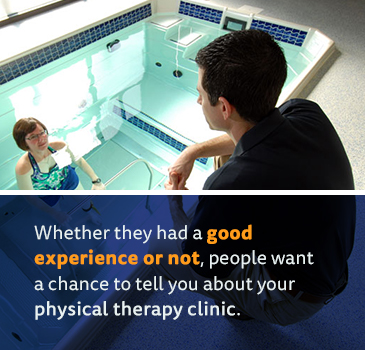
A physical therapy patient satisfaction questionnaire is an excellent tool to increase patient retention. In person, people are more likely to give you the answer they think you want. A written survey tends to elicit more factual information. Offering the survey will make your patients feel important, like their opinion really matters to you.
The information you get in your survey can help you make changes that improve your practice. You are a professional, but what is most important is that patients perceive the value of your services. If there is a way to present them differently to increase the perceived value, you want to make that change.
A satisfaction survey is also a means of re-connecting with a patient who might have dropped out. You can follow-up with a phone call after the survey to try to address their specific concerns. Even with a survey and a personal phone call, retaining an existing client requires fewer resources than attracting a new one.
Set up a Physical Therapy Patient Referral Program
Patient referrals are a way for your satisfied patients to share their experience with their family and friends. A referral program provides additional incentive and makes this referral process easier for your patients.
Everyone likes to get something for free, so use your clinic to incentivize referrals. Offering a free service or an opportunity to try something new like aquatic therapy for free will get your patients’ attention. The best way to encourage long-term physical therapy patient relationships is to give away a free diagnostic test. This way, you and your patient will be gaining information that can guide future treatment for additional health benefits.
In order to keep the referrals coming, set up a graduated program where patients get a bigger reward when they reach certain referral milestones. Give your patients a chance to earn a free fitness item after their fifth referral. Make the incentives fun, wellness related and valuable to match the value of patients bringing in new patients.
Provide Services Your Competitors Don’t
Standing out from the crowd will get more patients in your physical therapy clinic and help you retain those patients. One of the best ways to stand out is to offer new, interesting and innovative therapy modalities. Patients tend to get bored with the same therapy routines, so you have to give them something to get excited about to keep them coming back.
Aquatic therapy, for example, is not a modality that every physical therapy clinic offers. Adding aquatic therapy or an underwater treadmill to your physical therapy clinic would set you apart from your competitors and invigorate your patients. Plus, it is possible achieve better, faster results for your patients.
A hydrotherapy and conditioning pool from HydroWorx, with an integrated underwater treadmill, could even get the attention of your competitors’ patients as well as bring referrals to your clinic specifically for advanced aquatic therapy. The patented training system of HydroWorx could make you a leader in sports medicine and conditioning, as well as physical therapy.
Whether the majority of your patients are injured athletes or aging Baby Boomers, aquatic therapy can improve their outcomes and their attitudes about therapy all at once. The HydroWorx underwater treadmill quickly increases range of motion for those recovering from joint injuries or joint replacement surgery, and you know that increased range of motion is one of the top priorities for most patients.
Training under water, of course, eliminates body weight and joint impact concerns and reduces the chance of further damage. The underwater treadmill is the perfect environment to begin gait training. Unlike others, the HydroWorx treadmill replicates the same biomechanics as land-based training, so performance improvements made in the water can be duplicated on land where they really count for athletes.
Keeping current on new services you could offer patients is a great way to improve your patient retention rate. New treatments and technologies will always offer an opportunity to provide services that your competitors don’t —if you learn about them quickly and incorporate them into your physical therapy practice.
The other thing you have to offer that other practices don’t is your personal attention. Use the rapport you build with your patients as a tool to keep them coming back. When you provide the service your patients need and your own special brand of customer service, they will want to continue working with you.
Learn More
HydroWorx hydrotherapy and conditioning products are an excellent way to keep your physical therapy patients engaged. To learn more about the benefits of the patented HydroWorx system, visit us online today for a free info kit.


